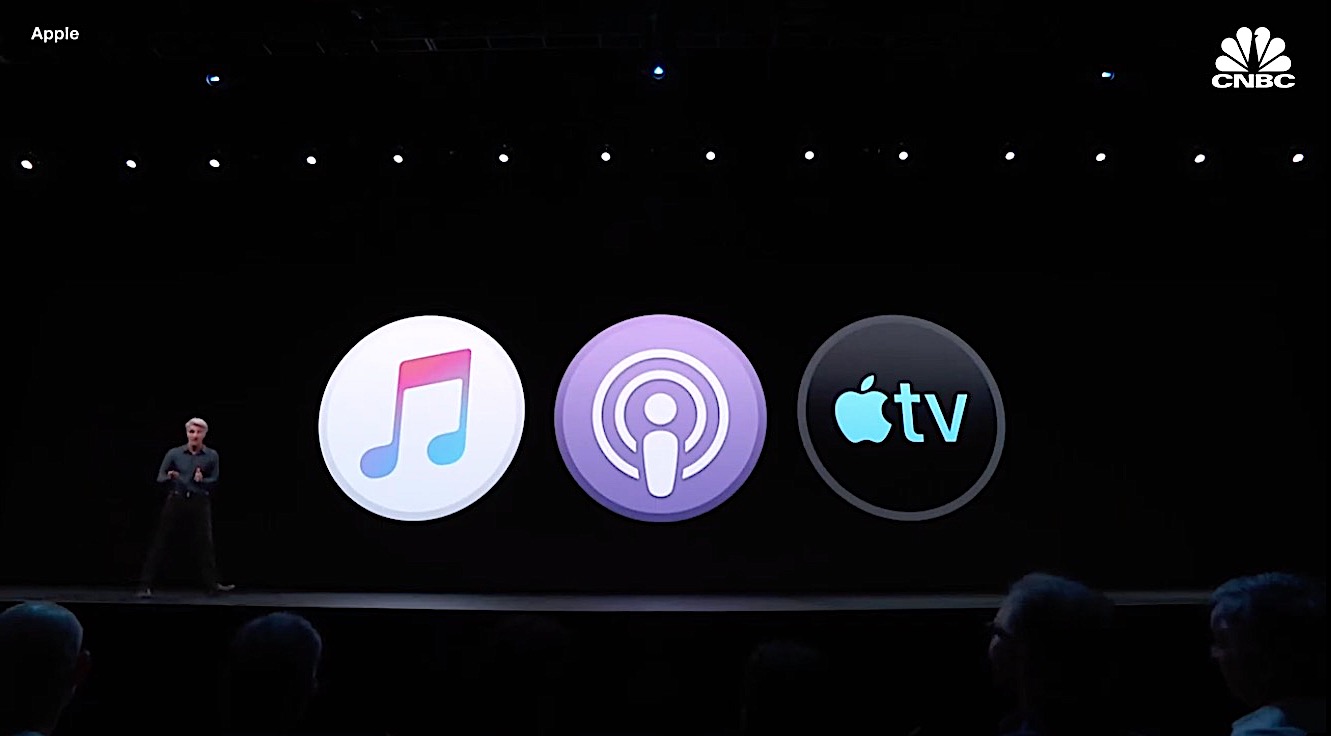Apple is killing off iTunes for the Mac, but 3 new apps will mostly replace it


A free daily email with the biggest news stories of the day – and the best features from TheWeek.com
You are now subscribed
Your newsletter sign-up was successful
The Apple's new Mac operating system, MacOS 10.15, or Catalina, is released this fall, it will not longer have iTunes, the venerable but arguably bloated music/video/podcast/iPhone-management app. Well, at least Apple is arguing that it's bloated. When it first appeared 18 years ago, "iTunes started completely focused," Apple's Craig Federighi said at Monday's WWDC gathering: "Rip, mix, and burn songs on your Mac." Then came the music store, video and book purchases, podcasts, and iPhones and iPads to manage.
"Customers love iTunes and everything it can do," Federighi said, pivoting into sarcasm: "But if there's one thing we hear over and over, it's 'Can iTunes do even more?'" He joked about adding calendar and email to the media-management app. In reality, iTunes is mostly being split into three separate apps on the Mac — Apple Music, Apple Podcasts, and Apple TV — and people will manage their iPhones and iPads in the finder window, so you don't have to launch a new app to sync your device.
Apple promises that your songs and albums — both purchased online and ripped — will appear in Catalina's Apple Music app, while TV shows and movies will sort themselves into Apple TV and podcasts into the podcast app. The impetus for the change isn't just bloat but also Apple's revenue-focused push to pivot toward subscription services for music, video, news, and games, plus the changing way people are listening to music — streaming, not purchasing songs or albums. If you like to buy your music, though, Apple's iTunes Store will still be available on iPhones and Windows PCs and tucked away in the Apple Music app in Catalina.
The Week
Escape your echo chamber. Get the facts behind the news, plus analysis from multiple perspectives.

Sign up for The Week's Free Newsletters
From our morning news briefing to a weekly Good News Newsletter, get the best of The Week delivered directly to your inbox.
From our morning news briefing to a weekly Good News Newsletter, get the best of The Week delivered directly to your inbox.
A free daily email with the biggest news stories of the day – and the best features from TheWeek.com
Peter has worked as a news and culture writer and editor at The Week since the site's launch in 2008. He covers politics, world affairs, religion and cultural currents. His journalism career began as a copy editor at a financial newswire and has included editorial positions at The New York Times Magazine, Facts on File, and Oregon State University.
-
 Is Andrew’s arrest the end for the monarchy?
Is Andrew’s arrest the end for the monarchy?Today's Big Question The King has distanced the Royal Family from his disgraced brother but a ‘fit of revolutionary disgust’ could still wipe them out
-
 Quiz of The Week: 14 – 20 February
Quiz of The Week: 14 – 20 FebruaryQuiz Have you been paying attention to The Week’s news?
-
 The Week Unwrapped: Do the Freemasons have too much sway in the police force?
The Week Unwrapped: Do the Freemasons have too much sway in the police force?Podcast Plus, what does the growing popularity of prediction markets mean for the future? And why are UK film and TV workers struggling?
-
 TikTok secures deal to remain in US
TikTok secures deal to remain in USSpeed Read ByteDance will form a US version of the popular video-sharing platform
-
 Unemployment rate ticks up amid fall job losses
Unemployment rate ticks up amid fall job lossesSpeed Read Data released by the Commerce Department indicates ‘one of the weakest American labor markets in years’
-
 US mints final penny after 232-year run
US mints final penny after 232-year runSpeed Read Production of the one-cent coin has ended
-
 Warner Bros. explores sale amid Paramount bids
Warner Bros. explores sale amid Paramount bidsSpeed Read The media giant, home to HBO and DC Studios, has received interest from multiple buying parties
-
 Gold tops $4K per ounce, signaling financial unease
Gold tops $4K per ounce, signaling financial uneaseSpeed Read Investors are worried about President Donald Trump’s trade war
-
 Electronic Arts to go private in record $55B deal
Electronic Arts to go private in record $55B dealspeed read The video game giant is behind ‘The Sims’ and ‘Madden NFL’
-
 New York court tosses Trump's $500M fraud fine
New York court tosses Trump's $500M fraud fineSpeed Read A divided appeals court threw out a hefty penalty against President Trump for fraudulently inflating his wealth
-
 Trump said to seek government stake in Intel
Trump said to seek government stake in IntelSpeed Read The president and Intel CEO Lip-Bu Tan reportedly discussed the proposal at a recent meeting
